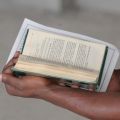14th Sunday in Ordinary Time (Year B) July 8 (Ezekiel 2:3-5; Psalm 123; 2 Corinthians 12:7-10; Mark 6:1-6)
Few people could have handled Ezekiel’s encounter with God and the realm of the spirit — or would have even wanted to. Ezekiel lived among the exiles in Babylon in the mid-sixth century BC. As he sat by the Chebar River — rivers play an important role in the lives of prophets and visionaries — he had a terrifying vision of the heavens. If this were not enough, a spirit soon entered him and began to speak and to charge him with an important mission.
Mystically driven life
By Fr. Ron RolheiserMysticism is an exotic word. Few of us connect mysticism with ordinary experience, especially with our own experience. Mysticism is generally seen as an exotic thing, a paranormal thing, a special kind of consciousness given only to the most elite within the spiritual life.
But mysticism isn’t extraordinary, paranormal or weird, but an important, ordinary experience.
British Carmelite Ruth Burrows defines mysticism this way: Mysticism is being touched by God in a way that is deeper than language, thought, imagination and feeling. It’s knowing God and ourselves beyond explicit thought and feeling.
The Father is a God of the living
By Fr. Scott Lewis, S.J13th Sunday in Ordinary Time (Year B) July 1 (Wisdom 1:13-15; 2:23-24; Psalm 30; 2 Corinthians 8:7, 9, 13-15; Mark 5:21-43)
Since the beginning of time humans have experienced death as a relentless and merciless hunter. Death is a primal fear that is always lurking in the background of human consciousness. Even with modern so-called sophistication, people deny the inevitability of death in various ways: outright denial, endless expensive treatments and therapies to retain the illusion of youth or technological “solutions” such as cryogenics. In the end, however, the morality rate is 100 per cent — no one gets through life alive!
Moving beyond our bad habits
By Fr. Ron RolheiserWe all have our faults, weaknesses, places where we short-circuit morally, dark spots, secret and not-so-secret addictions. When we’re honest, we know how universally true are St. Paul’s words when he writes: “The good thing I want to do, I never do; the evil thing that I do not want to do — that is what I do.” None of us are whole, saints through and through. There’s always something we are struggling with: anger, bitterness, vengefulness, selfishness, laziness or lack of self-control (major or minor) with sex, food, drink or entertainment.
Our work is about the Lord
By Fr. Scott Lewis, S.JBirth of John the Baptist (Year B) June 24 (Isaiah 49:1-6; Psalm 139; Acts 13:22-26; Luke 1:57-66, 80)
What will this child become? Many people — especially new parents — ask this question when they gaze upon a newborn baby. In any large group of infants there are a few who will become great, a much larger group destined for relative anonymity and a few headed for frightening notoriety. All, however, enter this world with free will and a wide range of possibilities. No one begins life with a signed and sealed fate from which there is no escape.
‘There’s always something!’
By Fr. Ron RolheiserA friend of mine jokingly says that when she dies she wants this epitaph on her gravestone: There was always something!
And there always is. All of us appreciate her frustration. Invariably, there’s always something, big or small, that casts a shadow and somehow keeps us from fully entering the present moment and appreciating its richness. There is always some anxiety, some worry about something that we should have done or should be doing, some unpaid bill, some concern about what we need to face tomorrow, some lingering heartache, some concern about our health or the health of another, some hurt that is still burning or some longing for someone who is absent that mitigates our joy. There’s always something, some loss, some hurt, some jealousy, some obsession or some headache, that is forever draining the present moment of its joy.
The Father determines all human destinies
By Fr. Scott Lewis, S.JEleventh Sunday in Ordinary Time (Year B) June 17 (Ezekiel 17:22-24; Psalm 92; 2 Corinthians 5:6-10; Mark 4:26-34)
A parable or metaphor plucked from its original time and place is often difficult to understand. At first glance, the image of planting and tending shoots in the reading from Ezekiel seems vague and puzzling. It is only when we study chapter 17 in its entirety and place it in the context of the sixth century BC that it becomes clearer.
The crack in our pitcher
By Fr. Ron RolheiserThere’s a much quoted line from Leonard Cohen that suggests that the place where we are broken is also the place where our redemption starts: “There is a crack in everything, that’s how the light gets in.”
That’s true, a major wound is often the place where wisdom flows into our lives and a weakness that habitually overpowers us can keep us aware of our need for grace. But that’s half of the equation. A fault, while keeping us humble, can also keep us in mediocrity and joylessness.
John of the Cross offers us this image by way of an explanation:
Poetry can open us to Church’s gifts
By Mary MarroccoJonathan recalled his conflict with a co-worker. In mid-sentence, he paused for a full minute, then said, “I’m not an angry person, am I? I don’t want to be an angry person.”
Why is it so difficult, sometimes, to acknowledge we’re angry? Even those of us who are pretty good at showing anger can find it hard to own. We might fear its power, or have experience of the ways anger can unleash terrible harm. Yet some Church Fathers thought anger existed in Paradise: could we imagine anger an unfallen, pure gift of God? A force that works within us, creatively rather than destructively?
Jesus’ blood bears witness to God’s love
By Fr. Scott Lewis, S.JBody and Blood of Christ (Year B) June 10 (Exodus 24:3-8; Psalm 116; Hebrews 9:11-15; Mark 14:12-16, 22-26)
From the beginning of human history until our own day, blood has both repelled and fascinated humans. It has played a prominent role in religion, politics and, unfortunately, entertainment.
The ancient Hebrews believed that blood was the bearer of life itself, and as such must always be treated with reverence and respect. People were forbidden to ingest the blood of animals. Human blood that had been spilled always required recompense and justice. Blood was powerful — it was offered to the gods or to God in sacrifice. It could both purify and ward off evil. The blood of Passover over Israelite doors turned aside the angel of death.
Sun, storms, wilderness, deserts and spirituality
By Fr. Ron RolheiserA number of years ago, accompanied by an excellent Jesuit director, I did a 30-day retreat using the Spiritual Exercises of St. Ignatius. In the third week of that retreat there’s a meditation on Jesus’ agony in the garden. I did the meditation to the best of my abilities and met with my director to discuss the result. He wasn’t satisfied and asked me to repeat the exercise. I did, reported back to him, and found him again dissatisfied. I was at a loss to grasp exactly what he wanted me to achieve through that meditation, though obviously I was missing something. He kept trying to explain to me that Ignatius had a concept wherein one was supposed to take the material of a meditation and “apply it to the senses” and I was somehow not getting that part.



